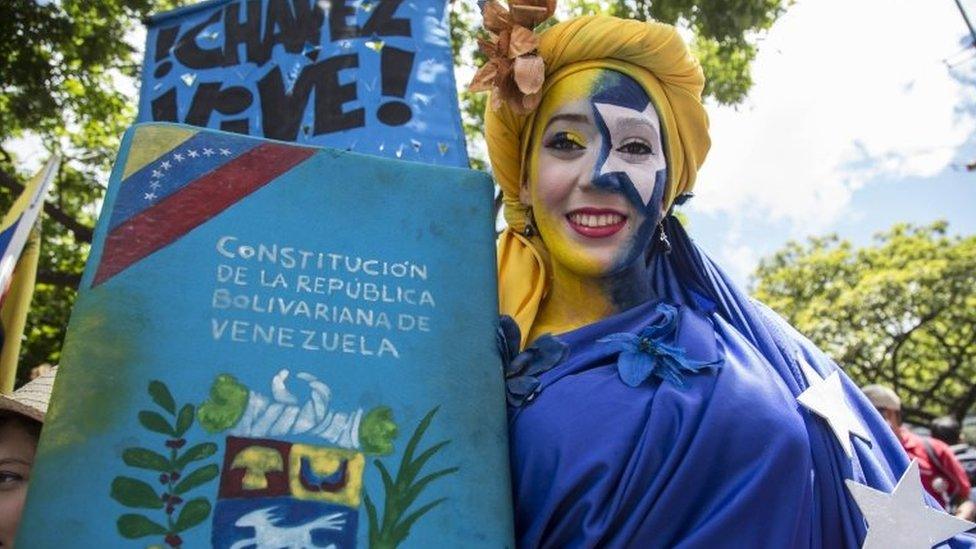Venezuela cracks down on opposition in wake of 'attack'
- Published
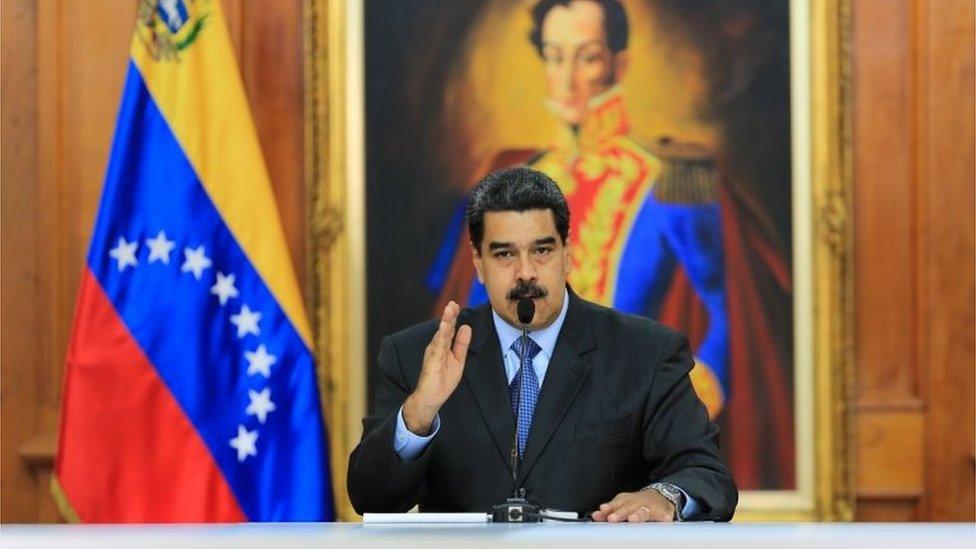
President Maduro said opposition politicians Julio Borges and Juan Requesens were behind an attack on his life
A Venezuelan opposition lawmaker has been arrested and a warrant issued for another living in exile, amid a crackdown after an alleged drone attack against President Nicolás Maduro.
The government has blamed Juan Requesens and Julio Borges for what it calls a bid to kill the president.
The moves came as a powerful government official revealed plans to strip the pair of their immunity.
But some government critics denounced the alleged attack as a "farce".
Who are the lawmakers?
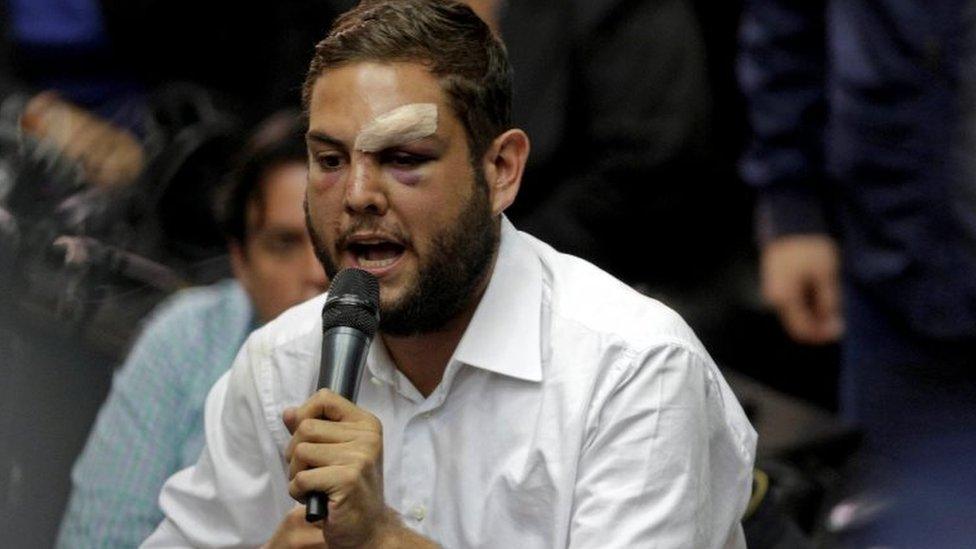
Juan Requesens was beaten up during an anti-government protest in April
Both Mr Requesens and Mr Borges are members of the opposition-controlled National Assembly, and of the Primero Justicia (Justice First) party.
Mr Borges, 48, founded the party and led the National Assembly before going into exile.
Mr Requesens, 29, is one of President Maduro's most outspoken critics, and has taken part in many anti-government demonstrations.
According to Mr Requesens' party, he and his sister Rafaela - an opposition student activist - were taken from their apartment in the capital Caracas by members of the secret police, Sebin.
Primero Justicia tweeted a video which appears to show CCTV footage of the two siblings getting out of the lift before being apparently pushed back by armed masked men in uniform, one of whom turns the camera to the wall.

Allow X content?
This article contains content provided by X. We ask for your permission before anything is loaded, as they may be using cookies and other technologies. You may want to read X’s cookie policy, external and privacy policy, external before accepting. To view this content choose ‘accept and continue’.

Rafaela Requesens was later released but Juan Requesens has not been heard of since he was taken away.
It is not clear if official charges have so far been brought against Mr Requesens, however, the government is preparing to put him on trial.
The government later issued a warrant for the arrest of Mr Borges.
President Maduro accused the pair on television of plotting Saturday's alleged drone attack on him.
He said those already detained in connection with the incident had implicated the two men, saying Mr Borges had the "cowardice" to carry out the attack. He called Mr Requesens "one of the craziest and psychopathic ones".
In a post in Spanish on Twitter, Mr Borges dismissed the accusations as a "farce", external.
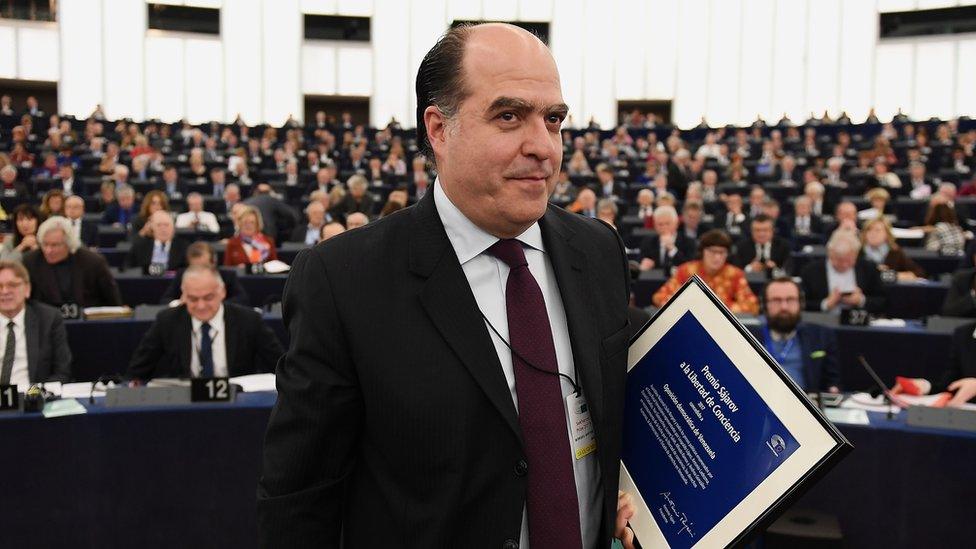
Julio Borges received the Sakharov prize on behalf of the Venezuelan opposition last year
Some in the opposition, like Mr Borges, think the attack was staged by the government to justify a further crackdown on the opposition.
They say the fact that the president of the powerful National Constituent Assembly, Diosdado Cabello, has called for a session later on Wednesday to strip the two lawmakers of their parliamentary immunity proves their point.
Venezuela's attorney general said Mr Requesens would go on trial once his immunity had been stripped.

National Constituent Assembly
Convened by President Maduro in 2017 ostensibly to rewrite Venezuela's constitution
Entirely made up of government supporters
Most decisions are approved unanimously by a mere show of hands
Government critics say it was created to bypass the National Assembly

The opposition says the government launched two drones, one of which exploded near the podium where President Maduro was giving a speech on Saturday, to back its theory that the opposition are coup-plotters conspiring to bring the leader down with the help of Colombia and the US.
What happened in the attack?
TV footage of the event shows President Maduro's wife looking up startled. Then an explosion is heard and the president's bodyguard is seen rushing to shield him.
Footage showed dozens of soldiers running away before the transmission was cut off
A second, more muffled explosion can be heard and Mr Maduro leaves the stage.
The footage does not show any drones or explosions, only the startled expressions of those on the stage. This led many to speculate that there were no drones.
However, two videos have since emerged apparently showing two drones. One, published by Caracas News 24, shows a drone exploding:

Allow X content?
This article contains content provided by X. We ask for your permission before anything is loaded, as they may be using cookies and other technologies. You may want to read X’s cookie policy, external and privacy policy, external before accepting. To view this content choose ‘accept and continue’.

An analysis carried out by website Bellingcat, external, which uses open-source information to investigate the incident, suggests that the video was taken on Bolívar Avenue, where President Maduro was speaking.
The second video reportedly taken by a cameraman for Telemundo and tweeted by journalist Adriana Núñez Rabascall appears to show a drone crashing against the wall of a building.

Allow X content?
This article contains content provided by X. We ask for your permission before anything is loaded, as they may be using cookies and other technologies. You may want to read X’s cookie policy, external and privacy policy, external before accepting. To view this content choose ‘accept and continue’.

The building seems to be the same one where firefighters reported a fire shortly after President Maduro had left the stage.
However, three firefighters told the Associated Press news agency on Saturday that it had been caused by an exploding gas tank, casting doubt on the government's version of events.
Bellingcat concludes that there were two drones which "likely carried some form of explosive device" and which "attempted to attack a parade at which President Maduro was speaking".
Why would the attack be staged?
Those who believe it was staged say it allows the government to further tighten the screws on the opposition.
However, Venezuela analyst David Smilde of the Washington Office on Latin America told the BBC he was sure it was not an event staged by the government because it looked "terrible".
"Maduro being interrupted in mid-set and one of his military officials fainting behind him and then the National Guard breaking rank and scattering, running for cover, I think the optics were absolutely terrible for him.
"This made him look highly vulnerable and it could spark the imagination of more people," Mr Smilde said.
- Published5 August 2018
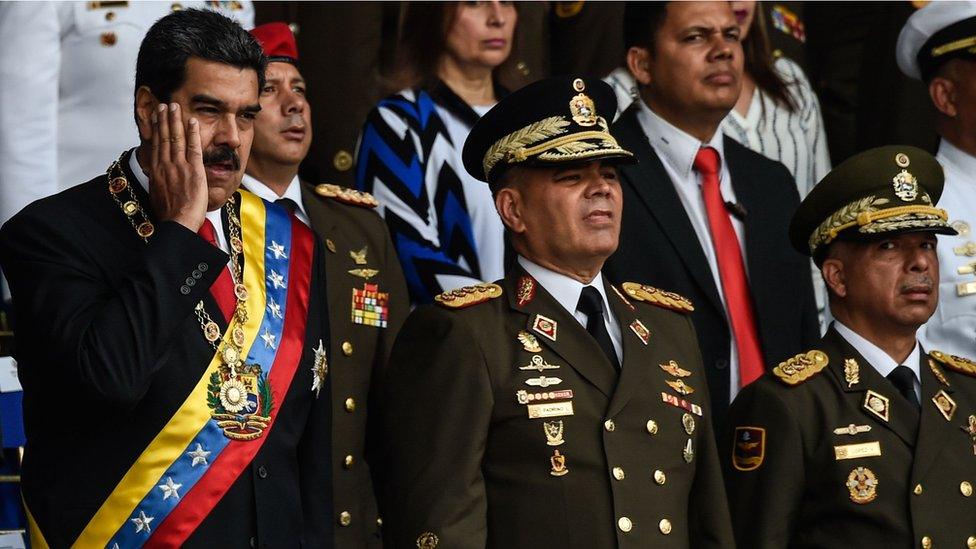
- Published5 August 2018

- Published28 July 2018
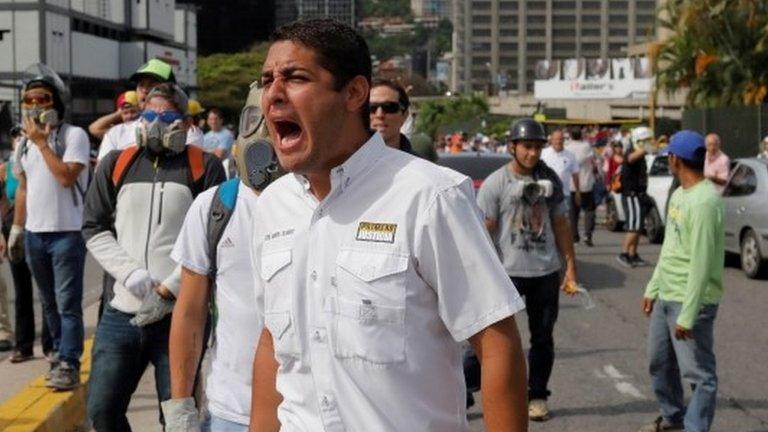
- Published3 July 2018
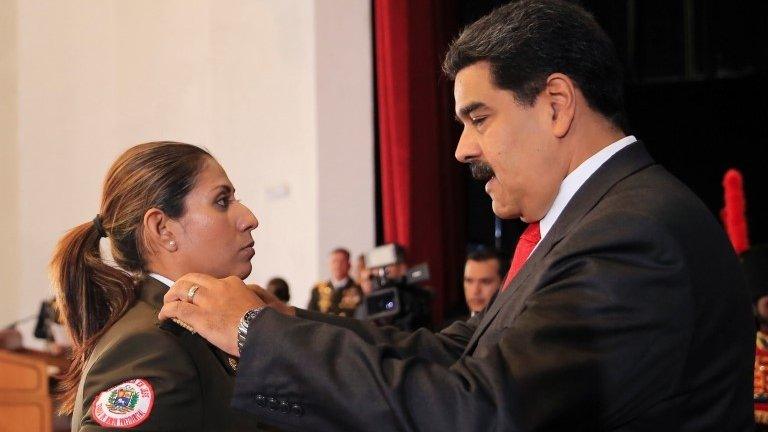
- Published30 August 2017
